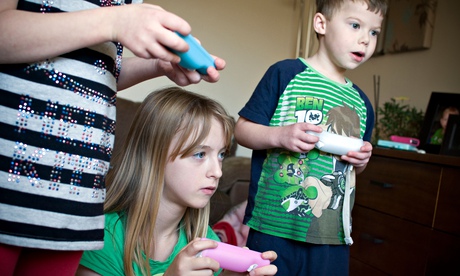
We tried. As parents who didn’t grow up with games consoles surrounding us, and television limited to just three channels (none of which broadcast all day), my wife and I at first restricted our boys’ use of consoles to a few hours each week – from 4pm on Fridays, Saturdays and Sundays to around 8pm.
It wasn’t a success. The approach of 4pm, or the possibility of not being in the house at the appointed hour, would drive both boys (one teenage, the other four years younger) to agitated, clockwatching distraction. So over the summer, we took the simple measure of removing the consoles. No games time, no distraction, no clockwatching.
As a way of getting your children away from screens, I can recommend it, though they found the cold turkey difficult at first. One learned rollerblading and archery (not simultaneously, fortunately); the other to cut out and assemble paper models (Papercraft – printed-out versions of Minecraft), and rock climbing. In a world where the distraction of a screen is never far away, this counted as a major success.
The new advice from the National Institute for Health and Care Excellence (Nice) that children should have TV-free days, or have two-hour limits on the time spent in front of screens, is a great idea. Quite apart from the aim of tackling obesity, it’s a good way of rediscovering the real world that exists beyond the lit pixels.
From some of the stories we hear, though, what many children actually need are TV-free nights – or, more specifically, TV-free bedrooms. We’ve never allowed our children to have a TV set in their bedroom, and are amazed and astonished by those who do. Children – especially boys – are terrible at moderating their screen time; the lure of the shifting colours is like a drug. Putting a TV or games console in their room is the worst possible move.
The problem then is, how do you get your children to become useful members of the digital world? The internet isn’t going away. One can only do so much; after a certain age, children don’t want you sitting by their shoulder as they surf the web, because they’re exploring their identity (just as you don’t want them looking at what you’re doing, even if it’s just reading email or social media). What you need is for them to explore it, but not to go completely native.
In this, it’s heartening – while also surprising – to discover that Apple founder Steve Jobs didn’t allow his children to use iPads, and that many other well-known technology leaders strictly limit their children’s use of computers and screens.
Chris Anderson, founder of Wired, told the New York Times that he has time limits and parental controls on every device; Evan Williams, a co-founder of Twitter and of Medium, doesn’t have iPads for his kids, he has books; Dick Costolo, chief executive of Twitter, said he’d allow children unlimited use of a gadget as long as he’s in the room, but also argued that too many time limits aren’t good because, once the children are off the leash and living on their own, they might gadget-binge.
All this is eminently sensible, and Costolo makes an excellent point: what we need to teach our children is how to control their own use of screens. As parents, my wife and I had to confront our own tendency to gaze at smartphone or tablet screens for that elusive email or message: was it really fair to take away our children’s screens while we kept snatching furtive glances at our own?
I like the solution that one technologically savvy parent laid out: give your children a set amount of screen time for consoles, tablets and TV per day or week, and then let them figure out for themselves how they’re going to divide it up. They decide if they’re going to surf YouTube, or watch a conventional TV show, or play a game. That teaches them how to divide up their time and to negotiate.
The only problem comes when you have multiple children and a limited number of screens, and one wants to play games at a time the other wants to watch TV (though hard-drive recording does solve that temporarily). The other confounding element is kids’ tendency to have one screen (usually TV) on in the background while they work on something else in the foreground. In this, though, they’re no different from their multi-tasking parents, who will have the radio on in the background while they do some work on a computer and watch for messages on their phone.
Perhaps our greatest – if indirect – achievement as parents came after the summer, when the consoles were reintroduced with the previous time limits. After observing a couple of weeks of bickering over who would get what time, we threatened to remove them again, whereupon the boys negotiated with each other and came up with an equitable time-sharing agreement. Maybe there’s hope for them after all.

